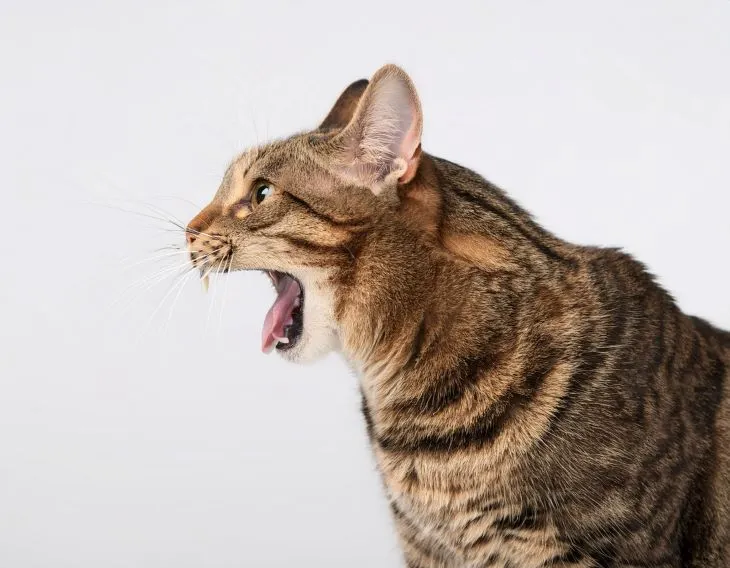Why Do Cats Gag? Causes And Solutions
By: Elizabeth Rikas

The information in this article is intended to educate cat parents and is not a substitute for veterinary guidance. In case of any concerns about your cat’s health, please talk with your veterinarian.
Cats sometimes gag, making hacking or coughing noises as they try to expel something from their throat. While gagging can occasionally be normal, it’s important to know the common causes and when it’s serious. In this guide, we’ll explore the reasons behind cat gagging, offer ways to help at home, and outline when it’s best to seek veterinary help.
What Is Cat Gagging?
Cat gagging occurs as a reflex when something irritates the throat or upper digestive tract. It’s an involuntary reaction that can sometimes be mistaken for coughing or vomiting. Gagging is often accompanied by sounds such as retching, coughing, or hacking. Understanding when gagging is harmless versus a health concern can help you ensure your cat’s safety and comfort.
Common Causes Of Cat Gagging

There are multiple reasons why your cat may gag, from simple hairballs to respiratory issues. Below are some of the most common causes and what you can do to help your cat feel better.
1. Hairballs – A Frequent Cause Of Cat Gagging
Cats are self-groomers, and during grooming, they ingest loose fur, which can accumulate and form hairballs in their stomachs. Cats gag to try to expel these hairballs, which is normal but can sometimes become excessive.
– Signs of Hairball-Related Gagging:
- Hacking or retching sounds.
- Vomiting up a tubular fur mass.
- Frequent throat clearing or swallowing.
– How to Help Your Cat:
- Brush your cat regularly to reduce loose fur, especially for long-haired breeds.
- Consider hairball-prevention foods rich in fiber.
- Try hairball remedy products like lubricating gels or treats to aid digestion.
2. Foreign Objects – Potentially Dangerous Gagging Triggers
Cats are curious and may chew on small objects like strings, rubber bands, or even fabric. When swallowed, these items can become lodged in the throat, leading to gagging as the cat tries to dislodge them.
– Signs of Foreign Object Ingestion:
- Gagging without vomiting.
- Excessive drooling or pawing at the mouth.
- Distress or difficulty breathing.
– What to Do If You Suspect a Foreign Object:
- Carefully remove any visible object from the mouth.
- Seek immediate veterinary care if the object is causing distress or can’t be easily removed.
- Prevent access to small items by keeping household objects out of reach.
3. Respiratory Infections – Common And Treatable Cause Of Gagging
Respiratory infections in cats, often caused by viruses or bacteria, can lead to gagging due to inflammation in the airways. These infections may cause your cat to sneeze, cough, or gag as they try to clear mucus from their throat.
– What to Do If You Suspect a Foreign Object:
- Persistent cough, sneezing, or nasal discharge.
- Fever, lethargy, or a reduced appetite.
- Watery or red eyes.
Click to know: How Many Teeth Do Cats Have?
– Treatment Options:
- Ask your vet about antibiotics or antiviral treatments.
- Use a humidifier to add moisture to the air, which can help with congestion.
- Keep your cat hydrated and comfortable while they recover.
Less Common, Serious Causes Of Cat Gagging
If your cat’s gagging becomes frequent or is accompanied by other worrying symptoms, it may indicate a more serious underlying issue. Here are some less common causes and when to contact your vet.
1. Asthma – A Chronic Condition That Can Cause Gagging
Feline asthma is a respiratory condition that causes coughing, gagging, and wheezing. Environmental triggers such as dust, smoke, or pollen can aggravate asthma, making it hard for your cat to breathe.
– Asthma Symptoms in Cats:
- Wheezing or open-mouth breathing.
- Persistent coughing or gagging episodes.
- Labored breathing, especially after physical activity.
– How to Manage Feline Asthma:
- Consult your vet for a proper diagnosis and treatment, which may include inhalers.
- Limit exposure to potential asthma triggers like scented products, dust, or cigarette smoke.
- Use hypoallergenic litter to reduce dust-related irritation.
2. Food Allergies or Sensitivities
Food allergies or intolerances can cause digestive discomfort, leading to gagging. Cats may gag if they eat something that doesn’t agree with their stomach or digestive tract.
– Allergy-Related Gagging Symptoms:
- Gagging or vomiting after meals.
- Loose stools or diarrhea.
- Skin irritation or frequent scratching.
– Dietary Adjustments:
- Try an elimination diet to identify the allergen, starting with hypoallergenic cat food.
- Avoid feeding your cat table scraps, especially dairy or foods with artificial additives.
- Consult your vet for guidance on dietary choices.
3. Gastrointestinal Upset
If your cat experiences digestive issues like nausea or acid reflux, they may gag. This can be due to stomach upset from gastritis, acid reflux, or a gastrointestinal infection.
– Signs of GI Issues in Cats:
- Vomiting bile or undigested food.
- Reduced appetite or eating grass.
- Stomach growling or signs of discomfort.
– What to Do:
- Feed smaller, frequent meals to ease digestion.
- Avoid feeding your cat right before car trips if they get motion sickness.
- Consult your vet if symptoms persist, as they may prescribe medication to ease nausea.
When Should You Be Concerned About Cat Gagging?

While occasional gagging is often harmless, frequent or severe gagging can indicate a health issue. Here are the main signs that mean you should consult a vet:
- Difficulty breathing or signs of choking.
- Persistent vomiting, especially if blood is present.
- Changes in behavior, excessive drooling, or refusal to eat.
Regular monitoring and prompt veterinary care can make a big difference if your cat’s gagging is linked to a health concern.
Fun Trivia: Can you spot the differences between Male and Female Cats
Preventive Tips To Reduce Cat Gagging
Taking preventive steps can help reduce the likelihood of gagging episodes, keeping your cat safe and comfortable.
Brush Regularly to Control Hairballs
Regular grooming minimizes the amount of loose hair your cat swallows, helping to prevent hairballs. Aim for daily brushing with long-haired cats and weekly brushing for short-haired ones.
Keep Small Objects Out of Reach
Cats are drawn to small objects that they can swallow, such as cords, strings, elastics, and beads. To prevent accidental ingestion, cat-proof your home by keeping these items stored away.
Provide a Healthy Diet
A balanced, high-quality diet supports your cat’s digestive health and reduces the risk of gastrointestinal issues. Opt for food with natural ingredients and avoid filler-heavy options that could irritate your cat’s stomach.
Reduce Environmental Allergens
Limit exposure to common respiratory irritants. Avoid smoking indoors, use unscented cleaning products, and select hypoallergenic litter to minimize respiratory issues in cats prone to asthma.
Final Thoughts
B However, frequent or persistent gagging should not be ignored. By understanding common causes, taking preventive measures, and knowing when to seek veterinary help, you can help ensure your cat stays happy and healthy.
Remember To Keep These Tips In Mind:
- Track the frequency and duration of gagging episodes.
- Identify potential triggers and make adjustments to reduce them.
- Consult your vet if you’re ever in doubt or notice new symptoms.
With the right care and observation, you can help reduce gagging episodes and make life more comfortable for your feline friend.
Frequently Asked Questions

About the Author
Elizabeth Rikas
Elizabeth is a passionate advocate for feline health and well-being, drawing from her years as a dedicated pet parent to three cats—Gypsy, Swan, and Alfred—and her invaluable experience volunteering at animal shelters. A seasoned writer with a lifelong love for cats, Elizabeth began sharing her insights in her teens and has since contributed extensively to platforms focused on feline care. Through her expertise and heartfelt dedication, she empowers pet owners with practical advice and research-backed knowledge to nurture their furry companions.
